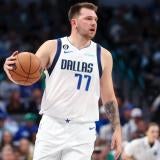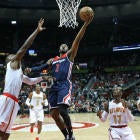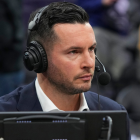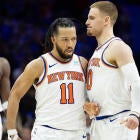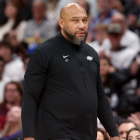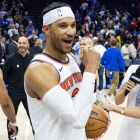The Washington Wizards eliminated the Atlanta Hawks from the playoffs with a 115-99 victory in Game 6 of their first-round series Friday, led by guards John Wall and Bradley Beal. Wall had a playoff career-high 42 points on 16-for-25 shooting, plus eight assists, four steals and two blocks in 44 minutes. Beal added 31 points on 11-for-17 shooting.
The Hawks had a terrible first half, turning the ball over 15 times and entering halftime down 65-45. They started taking care of the ball better in the third quarter, though, and went on an enormous run to make a game of it when coach Mike Budenholzer put center Dwight Howard on the bench and went with a small lineup.
Atlanta lost the game because of its first-half performance, and it lost hope because of Wall's brilliance down the stretch. Wall scored 19 points in the fourth quarter, including a few elbow jumpers and the highlight of the night, a chase-down block followed by a difficult layup in traffic:
John Wall gets it done on both ends! #NBAPlayoffs pic.twitter.com/vfU8rj6xsf
— NBA (@NBA) April 29, 2017
Wall scored Washington's final 13 points. The Wizards advance to face the Boston Celtics. Game 1 is on Sunday in Boston.
Three things to know:
Wall closed this one out
Washington led by as many as 22 points, but it was in serious danger in the fourth quarter. The chase-down block prevented Atlanta from making it a one-point game. Then he went on his insane scoring binge in the final minutes. This is the kind of performance that makes people yell about superstars "doing what superstars do" or declare that you should always bet on the team that has the best player in the series.
Wall's speed was the driving force in all of the Wizards' wins in this series. The Hawks were generally atrocious at getting back in transition (more on that later), and Wall punished them time after time. When things got uncomfortable, though, Wall was just as dangerous in the halfcourt. He recognized that he could just step into open jumpers off of the pick-and-roll, and he put the game away that way.
In his postgame interview with Israel Gutierrez, Wall said that he's "a way better player than he was two years ago." That's true mostly because, as detailed in Lee Jenkins' recent feature for Sports Illustrated, he's finally fully healthy. He has also developed as both a shooter and a play-maker, though, and that's one of the most important reasons Atlanta couldn't get past Washington like it did in the 2014-15 playoffs.
Also: Please watch this nasty spin and slam against Dennis Schröder in the post:
John Wall with another big lefty slam! #DCFamily pic.twitter.com/m9JUDWruRx
— NBA (@NBA) April 29, 2017
The Wizards still have issues
It's instructive that Wall only sat for four minutes, four seconds. The Wizards were outscored by 15 points in that time. Backup point guard Brandon Jennings was minus-19 in his 16 minutes, and I point that out not to point the finger at him, but to illustrate a larger Washington problem: It is still not deep enough. All series, The Hawks were able to take control of games or erase deficits when both teams had their second units on the floor, and that doesn't bode particularly well for the Wizards as they prepare to face Boston.
Washington's starting five is strong, and both Wall and Beal are delivering what the franchise hoped they would. The depth issue is real, though, and the front office tried to address it by signing Jennings and trading for Bojan Bogdanovic, both of whom had their moments against Atlanta. The Wizards' backup center, Ian Mahinmi, has hardly been healthy this season, and it seemed like a catastrophe when there was a question about reserve big man Jason Smith's availability due to a calf strain Friday.
What to make of the Hawks?
A few thoughts about Atlanta:
- Dennis Schroder was fantastic, averaging 24.7 points on 45.5 percent shooting, including 42.5 percent from deep, plus 7.2 assists. If he can build on this next season, then that could be the most significant development from this series. While Wall was great, Schröder never seemed intimidated and often came close to matching his production.
- The whole Howard thing is hard to figure out. He was the main culprit when it came to the Hawks' poor transition defense, and coach Mike Budenholzer went away from him late in several games because he wanted better spacing and ball movement. At the same time, Atlanta was the league's fourth-best defensive team and a much-improved rebounding team during the regular season, largely because of Howard's presence on the inside.
- The two-way play of Taurean Prince was promising. The Hawks have a stellar track record of getting the most out of wings with potential, and the fact he averaged 31.2 minutes in this series as a rookie says a lot about him. Don't be surprised if he holds onto the starting spot that he grabbed because of injuries late in the regular season.
- It's a little crazy that I'm only bringing up Paul Millsap now. He was fantastic in Game 6, scoring 31 points on 13-for-23 shooting with 10 rebounds, seven assists, four steals and a block in 46 minutes. If this was his last game in an Atlanta uniform, it was one of his best. Heading into free agency in July, his upcoming decision is now hanging over the whole organization.
After losing Al Horford, trading Jeff Teague and signing Howard, it was obvious that the Hawks were going to have to figure out a new identity. It is a bit alarming that, in big moments, they had to bench their highest-paid player in order to more closely resemble the versatile, ball-moving team they used to be.










